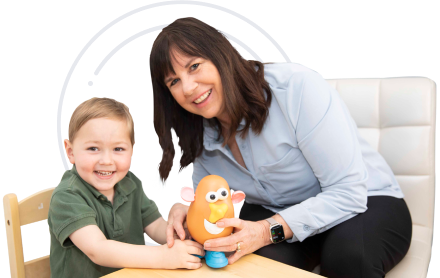Home Based ABA for Autism | Interview with Amy M.
Want to Learn how to Increase Talking & Decrease Tantrums in Children with Autism or Toddlers Showing Signs?
Want to start making a difference for your child or clients?

I met Amy M. over 20 years ago in pre-Facebook days on an old listserv that doesn’t exist anymore. We connected almost immediately when we realized that we both had sons named Lucas who had been diagnosed within months of each other, and they had similar diagnoses of PDD-NOS. Amy was still trying to figure out if she should try the one hour of OT, one hour of speech, and one hour of teacher time, or home based ABA therapy, and I insisted that she call me up so I could sell her on ABA. She became such an advocate for ABA therapy, that she also went back to school to become a BCBA.
Dr. Ami Klin says that from the initial concern of a parent to treatment for autism is about 3 ½ years. Half of the kids who have an autism diagnosis are getting treatment after the age of 5. When Amy’s son Lucas was diagnosed, the cost of the ABA programs and the waitlists were such a huge hurdle to get over, so she took matters into her own hands. Until her son got into therapy, she had her son on a strict regimen trying to teach him. A lot of her techniques mirrored some of the same techniques that Temple Grandin’s mother used to reach her.
“Put the support in when your child needs it, and pull it out when he doesn’t,” is how Amy describes the way they’ve approached Lucas’ schooling, social life, and career. She advocated for a smaller school that could handle both his autism diagnosis and the home based ABA plan that they came up with for him. And when they reached every new milestone like high school, college, and a new job, they reassessed what he’d need in order to succeed.
Wherever you’re at in your autism journey, I just want you to know that it’s always worth starting where you’re at and learning how to help your child. When you as a parent are empowered to take control of the journey, you’ll feel so much better. You can help your child make as much progress as possible, and you’ll be able to grow as a person as well along the way.
Today’s Guest
Amy M. from Kalamazoo, MI is the mom of Lucas, 24, diagnosed with autism at the age of 3, and Holly. After researching autism treatment options, Amy implemented an intensive, home based ABA program for Lucas starting in 2000. Inspired by the progress of her son, Amy pursued certification in behavior analysts and became a Board Certified Behavior Analyst in 2003.
Amy is the founder of Novel Responses, an ABA provider in Michigan with approximately 75 employees. Novel Responses Inc. provides home-based and center-based services to about 60 families.
You’ll Learn
- For Amy’s son, ABA therapy was like a way that they were trying to get his attention, and once they finally had it, his progress took off.
- Why Amy prefers what she calls a support method, where parents and professionals evaluate where a child is at and remove the supports when they no longer need them.
- How Amy’s navigating young adulthood with a very social son who sometimes misses social cues that might make him vulnerable to having someone take advantage of him.
Resources
- Turn Autism Around
- MaryBarbera.com/workshop (Sign up for a free workshop online for parents and professionals)
- #117: Interview with Dr. Temple Grandin on How to Turn Autism Around
- #068: Challenges of Autism Bullying, Dating Someone with Autism, and Learning to Drive with Autism
- Freaks, Geeks, and Asperger Syndrome: A User Guide to Adolescence
- Novel Responses Inc.
Want to Learn how to Increase Talking & Decrease Tantrums in Children with Autism or Toddlers Showing Signs?
Want to start making a difference for your child or clients?
